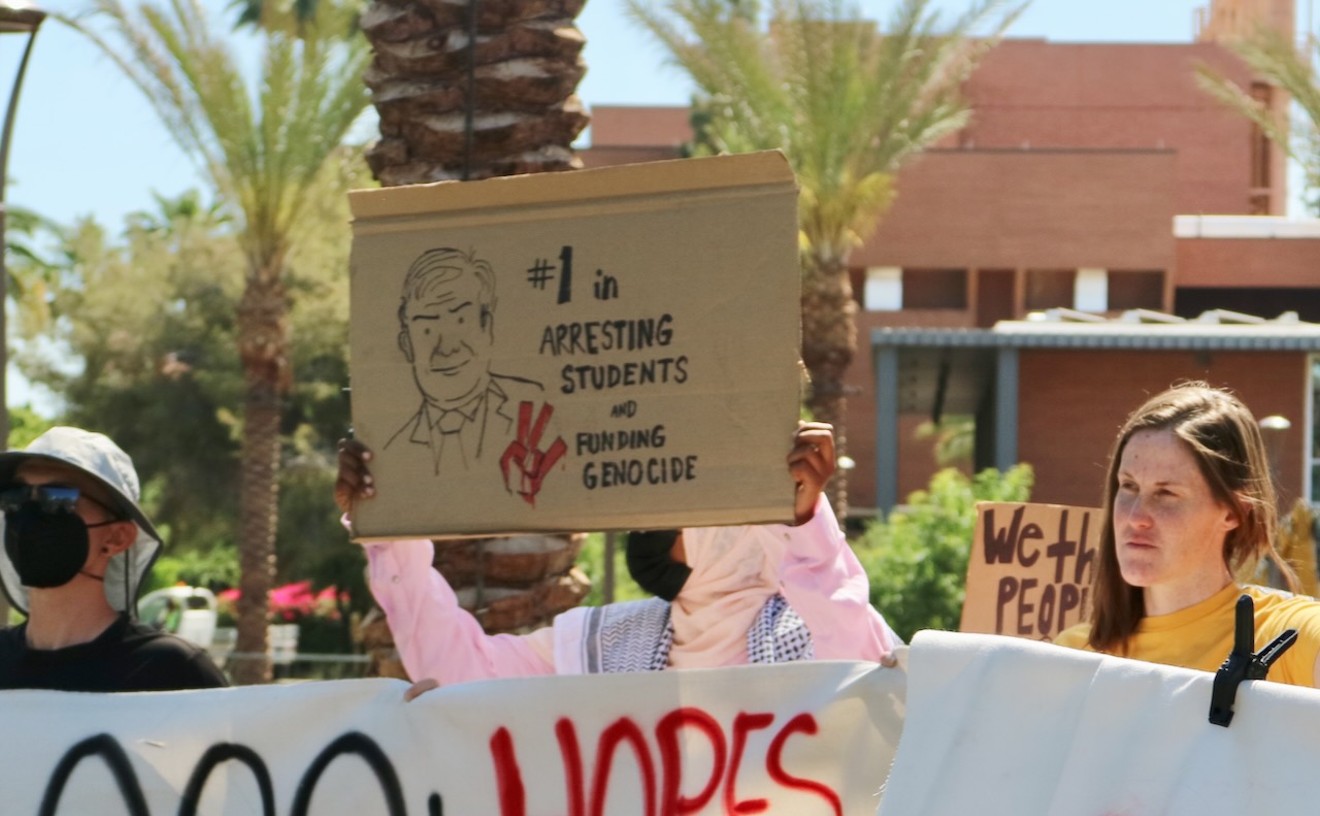''Sexuality is natural, necessary, and a lot of it happens with ignorance. Please don’t let pornography and sex ed be the only thing people have,'' she said late Tuesday afternoon, launching into a discussion of why her temple and what she calls her sacred sexual healing practices were an asset to men and women in Phoenix.
Elise is on trial for her role in operating the Goddess Temple and faces 22 criminal counts of prostitution, maintaining a house of prostitution, illegal control of an enterprise, money laundering, pandering, racketeering, and conspiracy. She is representing herself in the trial.
She and dozens of other temple workers (called practitioners) were arrested in September 2011 after the temple was called a New Age brothel in a New Times cover story. The article tipped off the Phoenix Police Department to the temple's activities.
Five years later, the big questions still remain: Was the Phoenix Goddess Temple a church offering sacred sexual healing or a brothel selling sex acts, and is Elise ''a priestess under attack,'' as she claims, or the leader of an underground prostitution ring?
In a trial that's dragged on for four months, the jurors have heard a lot about so-called sacred sexual healing, tantric sex, and how the Phoenix Goddess Temple operated on a day-to-day basis. And finally, today, they are expected to begin deliberations.
If convicted, according to the Maricopa County Attorney's Office, Elise could face at least three years in jail — she is one of only two people charged in this case who has refused to take a plea bargain.
As New Times described earlier this week, the trial itself has been filled with a colorful cast of witnesses and testimony. ''We’ve heard from goddesses, a high priestess, a Native American medicine man, a guru, a reality TV star, a porn star, two alien aficionados, and a naked life coach,'' Deputy County Attorney Chris Sammons told the jury in his closing statement.
But as both sides explained during their respective closing arguments, the case really comes down to one thing: whether money left by those coming to the temple (called seekers) constituted donations to the church for a healing ceremony or an explicit fee for the sexual services.
Elise has filed motion after motion during the past few years arguing that she should be allowed to use a religious freedom defense because what she practiced at the temple was part of her religion, but according to Arizona case law, the defense doesn’t apply in this situation.
"Her belief in the religiosity of what she does is not a defense,'' Deputy County Attorney Ed Leiter explained Tuesday afternoon in his rebuttal to Elise’s closing statement.
''Is Ms. Elise a common street pimp? No, but that doesn’t mean she didn’t manipulate people to get what she wants . . . What she’s begging you to do is to say that the rules and the law don’t apply to her.''
In a reference to the altars Elise often builds on her courtroom desk, Leiter added: ''The state doesn’t have a shrine to show you, and we don’t have a song and dance to show you [why she’s guilty], but what we have are those stubborn things that Ms. Elise doesn’t want you to look at: the facts of the case.''
Throughout much of the trial, Elise has focused on the good things she and other practitioners at the temple did for individual men and women and what she calls the ''global goddess movement,'' but the state consistently has pointed out that none of those things matter under the law.
Addressing the jury, Leiter explained: "The state admits there was some good [going on at the temple], but as the dispassionate finders of fact, it is your job to put aside the good works and ask yourself: 'Is what happened in those [temple] chambers prostitution?'
"And the answer is a resounding yes."
It doesn’t matter how she ran her temple or what words she used to describe what was happening, he said. "What matters is that the way she chose to do it was illegal and violates the law . . . Ignorance of the law, a misunderstanding of the law, is not a defense," he said.
My thoughts going into closing arguments today, at 1 o'clock pm. Your thoughts of love for ALL involved are appreciated, and if you're a metaphysics st, are much needed!
Posted by Tracy Elise on Tuesday, March 1, 2016
With a photograph of Mahatma Gandhi projected on the many television screens through the courtroom, Elise wrapped up her closing argument by invoking the great change-makers of history, like Gandhi (she has often compared her battle to that of the American civil rights movement), promising not to give up in her fight for sacred sexuality, even if she must do so through appeals from prison.
"It’s been a long journey," she said, as she began to cry; some of her friends and family in the courtroom could be seen crying as well. "But ladies and gentlemen of the jury, I am a priestess, not a prostitute."
The state will finish its rebuttal to Elise’s closing arguments — which includes a PowerPoint presentation of the "Top 12 reasons the money was a fee/fee arrangement and not a donation" — this morning. From there, the case will go to the jury.










